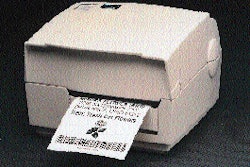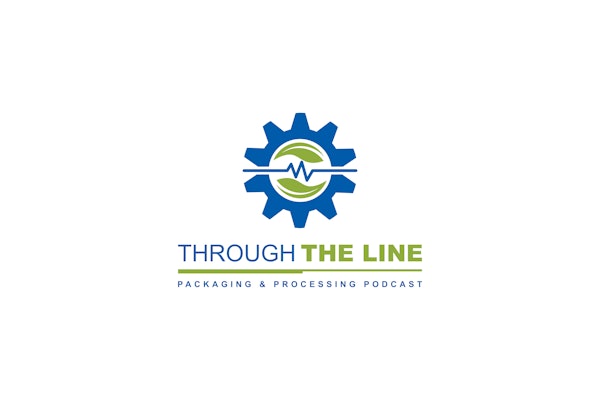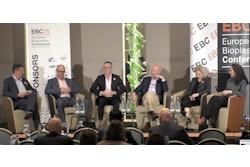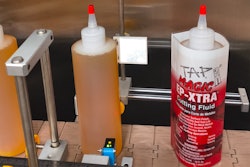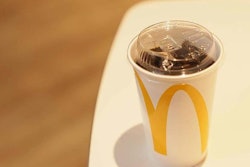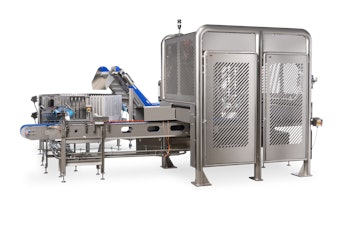
Apparently spooked by the specter of the BATF goblin, Anheuser-Busch is feverishly working on freshness labeling. Brewers have been asking the Bureau of Alcohol, Tobacco and Firearms(BATF) to develop a new "truth in labeling" regulation that might include a requirement for freshness dating. St. Louis-based A-B is developing a new freshness logo including a "born on" date indicating when the beer was packaged. A company spokesman, who asks not to be named, concedes, "This is a working thing." The information A-B plans to put inside the logo is subject to change. Nor has A-B committed to a date when the new logos will go on the bottles and cans. Inside the logo and adjacent to the "born on" date might be a reference such as: "freshest taste within 110 days." The logo may also include a reference to "brewery fresh taste guaranteed." A-B and Miller Brewing Co. use numbers printed by ink jet coders on the bottom of a bottle or can. They ostensibly tell a distributor when an "old" unsold bottle should be taken out of circulation. These dates are unreadable by consumers. Coors Brewing, Golden, CO, uses a date on the neck of its bottle, although there is no explanation to the consumer about what that date means. A-B's freshness logo seems an effort to undercut a more radical mandate stemming from BATF rulemaking, which is imminent. Petitions filed by A-B on January 26, 1996, and Boston Beer, Boston, on March 1, 1996, sparked the rulemaking, concedes Jerry Bowerman, chief of the wine, beer and spirits regulation branch at the BATF. In addition to the issues raised by the A-B and Boston Beer petitions, Bowerman says the BATF will include in its upcoming rulemaking "anything we have noticed in the past," which is to say there may be some "sleeper" issues in the mix. Boston Beer asked the BATF to require "point of origin" and freshness dating information on beer cans and bottles. Boston's Samuel Adams bottles have a 12-month calendar on the label with the notation "for brewery fresh taste, purchase before month notched." Although the Boston Brewery prod on freshness dating has apparently moved A-B, Miller Brewing is standing pat. The numbers on its bottle necks and can bottoms stand for the month, day and year, for example, 03136 to indicate March 13, 1996. There is no explanation to the consumer on how to decipher those numbers, or what the date means. Kari McGrath, a Miller spokeswoman, says that is a "best if used by" date. It is for the use of distributors, not consumers. "We believe the freshness date is best managed by the distributor," she explains. A-B requested disclosure of contract brewing and the name of the brewery when a trade name, such as Plank Road Brewery, is used. The first demand was aimed at Boston Beer and Pete's Brewing Co. According to the A-B petition, those two companies "do not disclose on their labels that brewers such as The Stroh Brewery Company, G. Heileman Brewing Company, Pittsburgh Brewing Company and others actually have been hired to brew, bottle and package products such as Samuel Adams Boston Lager and Pete's Wicked Ale." Jim Koch, president of Boston Beer, says Samuel Adams is "legally" brewed by his company, not the contractor, because Koch controls the recipe, brewing conditions and much else. "It would be misleading to put the name of the contract brewer on the label," he says. The argument about trade names was made with Miller Brewing and Coors Brewing in mind. A-B alleged they have set up "fictitious" trade names to sell ostensibly microbrewed beers. Those trade names are Plank Road Brewery (e.g., Icehouse and Red Dog brands) and Unibev Corp. (e.g., George Killian's) respectively. A-B notes on its Red Wolf Lager that the product comes from the Specialty Brewing Group of Anheuser-Busch. Kari McGrath, the spokeswoman for Miller/Plank Road, says that company research with focus groups "showed us that not having the Miller name on the label was not an issue with consumers." In fact, Plank Road was created so that it "could do things differently" from Miller. There is no telling what other issues could be raised during the BATF rulemaking. Someone, for instance, might question the notation on the Samuel Adams label "brewed in small batches with only honest ingredients." Koch says his beer is brewed with four basic ingredients: water, yeast, malt and hops. It is the only American beer allowed into Germany under that country's beer purity law, he points out. But when asked whether his label implies that other American beers use "dishonest" ingredients, he replies: "'Honest' is a subjective word. Anheuser-Busch might consider rice and high fructose corn syrup 'honest' ingredients. If they wanted to put 'honest' on their label, I would not object." c

